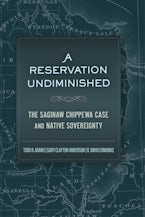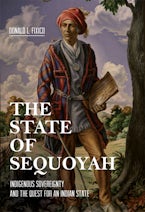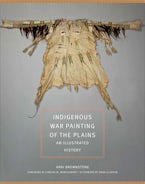HISTORY / Native American
Showing results 1-10 of 590
Filter Results OPEN +

A Reservation Undiminished
The Saginaw Chippewa Case and Native Sovereignty
Reservation Undiminished presents a cohesive narrative of a legal case that testifies to Native persistence in asserting territorial sovereignty in the twenty-first century—and that highlights the potential for conflict resolution in seemingly intractable legal struggles between state, local, and tribal governments.
The State of Sequoyah
Indigenous Sovereignty and the Quest for an Indian State
Few people today know that the forty-sixth state could have been Sequoyah, not Oklahoma. The Five Tribes of Indian Territory gathered in 1905 to form their own, Indian-led state. Researched and interpreted by distinguished Native historian Donald L. Fixico, this book tells the remarkable story of how the state of Sequoyah movement unfolded and the extent to which it remains alive today.
Between the Floods
A History of the Arikaras
Enhanced with the insights of archaeology, linguistics, and anthropology, and illustrated with Native maps and ledger art, as well as historic photographs and drawings, Between the Floods brings unprecedented depth, detail, and authenticity to its picture of the Arikaras in the fullness and living presence of their history.
The Bone Picker
Native Stories, Alternate Histories
While some of the horrors told here are “real life” in nature, the art of fiction that Mihesuah employs reveals surprising outcomes or alternative histories. It turns out the things that scare us the most can lead to the answers we are seeking and even ensure our very survival.
Reservation Politics
Historical Trauma, Economic Development, and Intratribal Conflict
By engaging a topic often avoided in political science and American Indian studies, Reservation Politics allows us to see complex historical processes at work in contemporary American Indian life. Orr’s findings are essential to understanding why tribal governments make the choices they do.
Cherokee Civil Warrior
Chief John Ross and the Struggle for Tribal Sovereignty
Centering a Native point of view, this book recasts and expands what we know about John Ross, the Cherokee Nation, its commitment to maintaining its sovereignty, and the Civil War era in Indian Territory. Weeks also provides historical context for later developments, from the events of Little Bighorn and Wounded Knee to the struggle over tribal citizenship between the Cherokees and the descendants of their former slaves.
Damming the Reservation
Tribal Sovereignty and Activism at Fort Berthold
In Damming the Reservation, Angela K. Parker, an enrolled member of the Three Affiliated Tribes, offers a deeply researched, unflinching history of the tribes’ fight to preserve and rebuild their culture, shared history, common stories, sense of place, and sovereignty in the face of what Vine Deloria Jr. called “the single most destructive act ever perpetrated on any tribe by the United States.”
Empires and Indigenous Peoples
Comparing Ancient Roman and North American Experiences
Sweeping in its scope and rigorous in its scholarship, Empires and Indigenous Peoples expands our understanding of their historical interrelations and raises general questions about the nature of the various imperial encounters.
Red Earth Nation
A History of the Meskwaki Settlement
Revealing how the Red Earth People have negotiated shifting environmental, economic, and political circumstances to rebuild in the face of incredible pressures, Red Earth Nation shows that with their first, eighty-acre land purchase in the 1850s, Meskwaki leaders initiated a process that is still under way.
Indigenous War Painting of the Plains
An Illustrated History
Offering first-time vivid access to the key works of war painting preserved in 37 museums throughout North America and Europe, Indigenous War Painting of the Plains illuminates distinctions between painting styles of different tribes, reveals how they influenced each other and changed over time, and, finally, conveys a deep understanding of how war painting developed in relation to profound social changes in Plains Indian cultures.

A Reservation Undiminished
The Saginaw Chippewa Case and Native Sovereignty
Reservation Undiminished presents a cohesive narrative of a legal case that testifies to Native persistence in asserting territorial sovereignty in the twenty-first century—and that highlights the potential for conflict resolution in seemingly intractable legal struggles between state, local, and tribal governments.
The State of Sequoyah
Indigenous Sovereignty and the Quest for an Indian State
Few people today know that the forty-sixth state could have been Sequoyah, not Oklahoma. The Five Tribes of Indian Territory gathered in 1905 to form their own, Indian-led state. Researched and interpreted by distinguished Native historian Donald L. Fixico, this book tells the remarkable story of how the state of Sequoyah movement unfolded and the extent to which it remains alive today.
Between the Floods
A History of the Arikaras
Enhanced with the insights of archaeology, linguistics, and anthropology, and illustrated with Native maps and ledger art, as well as historic photographs and drawings, Between the Floods brings unprecedented depth, detail, and authenticity to its picture of the Arikaras in the fullness and living presence of their history.
The Bone Picker
Native Stories, Alternate Histories
While some of the horrors told here are “real life” in nature, the art of fiction that Mihesuah employs reveals surprising outcomes or alternative histories. It turns out the things that scare us the most can lead to the answers we are seeking and even ensure our very survival.
Reservation Politics
Historical Trauma, Economic Development, and Intratribal Conflict
By engaging a topic often avoided in political science and American Indian studies, Reservation Politics allows us to see complex historical processes at work in contemporary American Indian life. Orr’s findings are essential to understanding why tribal governments make the choices they do.
Cherokee Civil Warrior
Chief John Ross and the Struggle for Tribal Sovereignty
Centering a Native point of view, this book recasts and expands what we know about John Ross, the Cherokee Nation, its commitment to maintaining its sovereignty, and the Civil War era in Indian Territory. Weeks also provides historical context for later developments, from the events of Little Bighorn and Wounded Knee to the struggle over tribal citizenship between the Cherokees and the descendants of their former slaves.
Damming the Reservation
Tribal Sovereignty and Activism at Fort Berthold
In Damming the Reservation, Angela K. Parker, an enrolled member of the Three Affiliated Tribes, offers a deeply researched, unflinching history of the tribes’ fight to preserve and rebuild their culture, shared history, common stories, sense of place, and sovereignty in the face of what Vine Deloria Jr. called “the single most destructive act ever perpetrated on any tribe by the United States.”
Empires and Indigenous Peoples
Comparing Ancient Roman and North American Experiences
Sweeping in its scope and rigorous in its scholarship, Empires and Indigenous Peoples expands our understanding of their historical interrelations and raises general questions about the nature of the various imperial encounters.
Red Earth Nation
A History of the Meskwaki Settlement
Revealing how the Red Earth People have negotiated shifting environmental, economic, and political circumstances to rebuild in the face of incredible pressures, Red Earth Nation shows that with their first, eighty-acre land purchase in the 1850s, Meskwaki leaders initiated a process that is still under way.
Indigenous War Painting of the Plains
An Illustrated History
Offering first-time vivid access to the key works of war painting preserved in 37 museums throughout North America and Europe, Indigenous War Painting of the Plains illuminates distinctions between painting styles of different tribes, reveals how they influenced each other and changed over time, and, finally, conveys a deep understanding of how war painting developed in relation to profound social changes in Plains Indian cultures.











